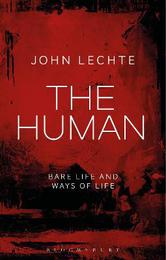
|
The Human: Bare Life and Ways of Life
Paperback / softback
Main Details
| Title |
The Human: Bare Life and Ways of Life
|
| Authors and Contributors |
By (author) John Lechte
|
| Physical Properties |
| Format:Paperback / softback | | Pages:272 | | Dimensions(mm): Height 234,Width 156 |
|
| Category/Genre | Western philosophy from c 1900 to now
Ethics and moral philosophy
Social and political philosophy |
|---|
| ISBN/Barcode |
9781350143883
|
| Classifications | Dewey:304.2 |
|---|
| Audience | | Professional & Vocational | |
|---|
|
Publishing Details |
| Publisher |
Bloomsbury Publishing PLC
|
| Imprint |
Bloomsbury Academic
|
| Publication Date |
26 December 2019 |
| Publication Country |
United Kingdom
|
Description
Why is it important to consider the human today? Exploring this question John Lechte takes inspiration from the interplay of two of Giorgio Agamben's concepts: 'ways of life' and 'bare life'. Stateless people, those who do not have a political community, such as asylum seekers and refugees, are no less human. However the European tradition, represented most clearly in Hannah Arendt's thinking of the opposition between the oikos, as the satisfaction of basic needs, and the polis, as the realm of freedom and glory, proposes the opposite of this. Arendt's famous phrase, 'the right to have rights', means that freedom and full human potential can only be realised in the context of civil society; in short, that only citizens can be fully human. Because Arendt's view is so influential, yet often not acknowledged, it is necessary to undertake a full investigation of the nature and meaning of the human to establish that it is not reducible to the citizen, but is always characterised by a 'way of life' - life mediated by language. The human is never reducible to 'bare life' - a life with no other significance than physical survival. The implications of 'bare life' are investigated through important themes in relation to the human, such as: freedom and necessity, the animal, animality as nature, inclusion and exclusion in politics, the sacred, death and dying, technics and nature, the Same and the Other, the everyday as extraordinary. Journeying through Agamben, Arendt, Bataille, Derrida, Hegel, Heidegger, Husserl, Levinas, Schelling, Simondon, and Stiegler, this is a profound search to reveal the truly human.
Author Biography
John Lechte is Professor of Sociology at Macquarie University, Sydney, Australia. He has published widely on French thought, particularly the work of Julia Kristeva. His most recent books are: Genealogy and Ontology of the Western Image and its Digital Future (2012) and he co-authored Agamben and the Politics of Human Rights: Statelessness, Images, Violence (2013). He has also published key essays on the thought of Georges Bataille, Julia Kristeva, Giorgio Agamben and Hannah Arendt, as well as on Derrida.
ReviewsHow can it be possible - as we so often see - for human life to be excluded, exploited, oppressed and, ultimately, destroyed in the very name of humanity? This is the crucial question that Lechte tackles in this philosophical tour de force. The domains of politics, ethics, economics, law and rights are all founded on the idea of the human and are meant to serve this end. Yet, this idea of humanity conceals a distinction, which has been with us since the Greeks, between human life as mere biological necessity, and human life as a 'way of life' - a division that allows certain ways of living to be denigrated. Lechte's bold and penetrating analysis forces us to question this assumption and, in doing so, disrupts the familiar categories of the Western political and philosophical tradition. Taking up from where Agamben left off, Lechte proposes a radical new understanding of the human as transcendent, as that which cannot be reduced to bare life. In doing so, he presents a fundamental challenge to the economic and political rationalities that today aim to objectify and control us. -- Saul Newman, Professor of Political Theory, Goldsmiths, University of London, UK I enthusiastically recommend John Lechte's The Human. Beginning with Hannah Arendt's experience of being a refugee, reduced to bare life and fleeing for her life, Lechte calls into question her claim that only a political life offers a remedy to reducing humans to bare life, and focuses on the transcendence of the human and the ways in which this transcendence is connected to various forms of life, political and otherwise. -- Peg Birmingham, Professor of Philosophy, DePaul University, USA
|